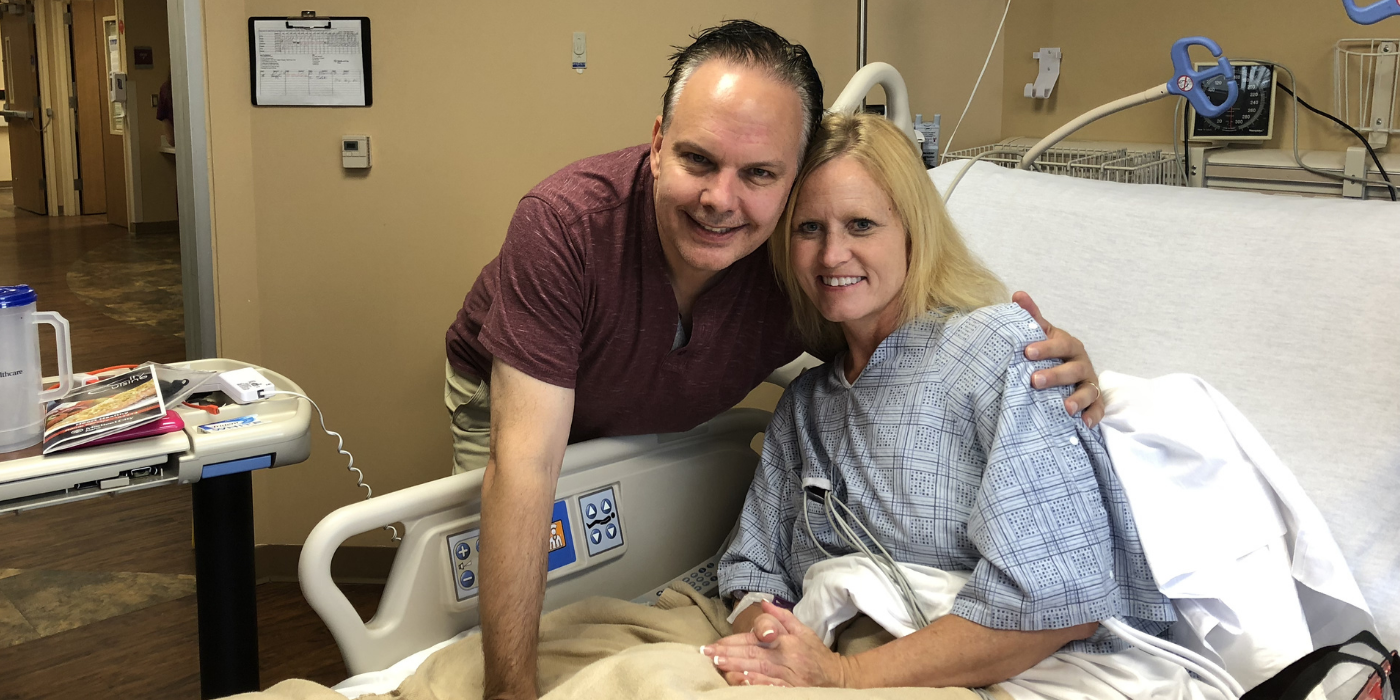October 11, 2018 started out as a normal day for Greg Coon (University of North Texas, ’89). However, he had no idea he would soon be only a few minutes away from losing his wife.
That day ran its course like any other day for Julie Coon. She met her friend, Diane, at Plano Senior High School to volunteer. When the two women were leaving the school, they stopped near the parking lot to chat.
Suddenly, Julie collapsed to the sidewalk in front of Diane. Julie was suffering a cardiac arrest.
Because of the quick actions of Diane to call 911 and other bystanders who administered CPR and used an AED (automated external defibrillator) to restart Julie’s heart, she is a survivor.
One of the key elements in saving Julie’s life was the location and use of the nearest AED. When someone suffers a cardiac arrest, the heart stops, and that person’s brain starts to die within just six minutes of not receiving oxygen.
After two shocks administered by the AED, Julie’s heart, which had stopped, returned to its normal rhythm.
Both Julie and Greg are incredibly thankful for the individuals surrounding Julie who acted quickly to save her life. But as Julie recovered, Greg got to thinking: How many lives are lost because an AED is not easily accessible?
“I never really knew the difference between a heart attack and a cardiac arrest until this happened to Julie. So I started reading about it,” said Greg. “When I was sitting at my desk and thinking about how the AED saved my wife’s life, I wondered, ‘Why can I ask Google or Siri where the closest Starbucks is…but I can’t find out where the closest AED is?’”
A lightbulb went off in that moment for Greg. He needed to figure this out and start working on a solution.
In honor of Julie and their 25th wedding anniversary, Greg created a petition on change.org with the mission to implement AED locations as a searchable item via a smart phone.
Greg’s initiative started to spread like wildfire through friends and family, and the local television station even picked up the story.
Due to the incredible publicity the story was receiving, along with perseverance and luck, Greg’s mission found its way to a global digital mapping company.
Within a couple months of discussions, the mapping company agreed that this search function could play a role in saving more lives and started planning how they could make this idea a reality.
But then COVID-19 hit.
After a few month’s delay, Greg and Julie resumed discussions with the mapping company about securing data, overcoming roadblocks and implementing first steps in rolling out this initiative.
The Coons are grateful for the interest in this project and are also looking into ways it could be implemented on a broader scale.
Greg says that this mission can be so much bigger than he and Julie imagined when it comes to fruition.
“If we can make that system global, think of how many lives can be saved,” said Greg. “The potential is so big. If this idea were to just really take off like I envision, the number of lives that could be saved are incalculable. How do you put your arms around that? How do you really appreciate that?”
Greg and Julie are both looking forward to implementing this mission on a larger scale and seeing AED locations as a standard searchable function for every local business.
In the meantime, the couple plans to continue advocating for AED and cardiac arrest education and giving back where they can in their community.
For Greg, that takes the form of volunteering his time on the Lambda Chi Alpha Alumni Association in the Dallas/Fort Worth area, assisting recolonization efforts of the North Texas chapter back in 2017 and serving as a board member for the Sudden Cardiac Arrest Association.
Julie will also be giving a TEDTalk in April of 2021 to raise awareness for cardiac arrest and to tell her story.
Greg says he will forever be indebted to the heroes who saved his wife’s life that day and wants to give back where he can, whether that is through Lambda Chi or elsewhere.
The value of service has played a huge role in Greg’s life, and having AEDs more accessible is just one more way Greg hopes to help make his community and this world a better place.
Learn more about Julie and Greg’s story here.


